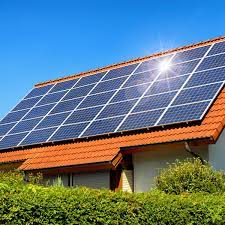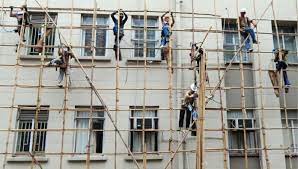Solar panels harness one of nature’s most powerful yet free resources: solar energy. Solar panels, also known as photovoltaic systems (PV systems), use semiconductor technology to convert sunlight energy into electricity that may power your home. But, are they the best option for your home? You can join thousands of other UK homeowners who agree that switching to renewable solar energy is good for both their wallets and the environment. Solar panels are low-profile and long-lasting, converting sunlight to energy quietly for decades. This is accomplished through integrated hardware and a basic design that secures the panels close to your roof and to each other for a minimalist appeal. Solar panels are engineered to be very efficient, producing maximum sun output year after year, even on rooftops with complex angles.
Home Solar Panels
According to national government figures, approximately 12,000 solar panels are installed in the UK each month. Because of the increased popularity of solar panels, prices have dropped by more than 80% in the last decade, and the trend appears to be continuing. Solar panel prices have progressively declined in recent years as new technologies have been developed to make solar energy components more cost-effective. Furthermore, solar panels can help you make money from excess electricity generated, in addition to lowering your energy expenditures. The UK government has also decided to eliminate VAT on energy-saving solutions, effective April 2022. A 4kW solar panel system would require around 16 250W solar panels, but a 5kW system would require 20 solar panels.
The number of solar panels required to power your home is determined by a few factors:
Your current electricity usage
Your energy objectives (How much of your consumption do you intend to cover?)
Roof’s capability
The number of hours of sunlight in your area
Solar panels can raise the value of your home by making it healthier for the environment. This is one of the house upgrades that will make your home more appealing to potential buyers, as the future owners will benefit from lower electricity bills as well. Naturally, the size of the solar panel system will influence how much the value increases. Also, keep in mind that different families will have varied energy consumption habits. This means that one method may be enough for some families while being insufficient for others. Effective solar panels may not be a useful addition to a property for certain buyers, nonetheless, it is a matter of personal preference. Some of the benefits of home solar panels are
#1. Lower Electricity Bills
Electric gadgets raise utility bills. Solar panels might help you save money on your electricity bills. Solar power is absolutely free, and basically, excess energy may always be stored for future use or exported back to the grid.
#2. Low Upkeep Is Required.
Solar panels have a median lifespan of 25-30 years and require little maintenance throughout this time. A high-quality inverter may need to be replaced every 10-15 years, but otherwise, you can enjoy the benefits of solar power under typical conditions. It is a good idea to have your installation evaluate your system on a regular basis. This is done just in case there are any cabling difficulties or loose brackets. In addition, you should also clean your solar panels on a regular basis and make sure they are free of leaves and twigs. Roof-mounted solar panels are effectively self-cleaning, as rainfall can aid in the removal of dust from the system.
#3. Unconnected to The Power Grid
Solar panels are useful for isolated places where building power lines to connect to power grids would be prohibitively expensive. Solar PV systems are a cost-effective and efficient alternative for remote residences in rural areas. Also, solar batteries can also be included in your solar panel system. These solar batteries save the energy generated by solar cells for rainy days or overnight use.
Home Solar Panel Costs
There are numerous reasons to build a home solar panel system. These reasons may be, whether you want to save thousands of dollars on electricity bills, reduce your carbon impact, or become more self-sufficient from the power grid. Going solar is an easy and popular option to increase the value of your home and your energy savings while generating sustainable energy directly at home. After the federal solar tax credit, most households will pay between $17,430 and $23,870 in 2023. Home solar panels are a long-term investment. EnergySage Marketplace customers often break even on their installations in eight to nine years; however, your expenses will ultimately depend on the incentives available in your state and the size of your system. Solar panels cost in the United States based on parameters such as state, manufacturer, and system size. Solar panels in the United States cost around $20,650 on average in 2023.
A typical household solar panel installation costs between £5,000 and £11,000 in the U.K. The entire cost of solar panels is determined by the number of panels required for your home, which is determined by your energy consumption. In general, the more expensive the system, the more electricity it can create and, hence, the greater the savings.
After factoring in the federal solar tax credit, the average cost of a solar panel installation in 2023 ranges from $17,430 to $23,870, with an average solar installation costing around $20,650.
Solar panel prices in 2023 are expected to average $2.95/W (before incentives). Solar installations are a one-of-a-kind product. The average solar panel costs might vary greatly depending on your location and the manufacturer of your chosen solar panels.
What Influences the Cost of Solar Panels?
A lot goes into the sticker price that a solar installer charges you. Solar installations are a one-of-a-kind product. The price you pay is significantly influenced by your specific situation as well as criteria related to your electricity use and property. Here are some of the most important elements to consider when determining the cost of solar panels for your property:
System size: the larger your solar panel system, the higher the cost. Importantly, as system size increases, the average per-unit price of solar drops.
Location: Pricing varies by state as a function of both local quotation patterns and system size differences. States with a larger average system size will naturally have a lower average cost of ownership.
Roof qualities: the cost of a solar panel installation is not solely determined by the equipment. Your solar contractor may also charge for the difficulty of the installation, and having a complicated roof may increase the cost of your system.
Home Solar Panel Kits
A solar power system ensures that you are prepared in the case of a natural disaster, whether you opt to ground mount or put your solar panel kits on your home’s roof. Whatever option you choose, you will no longer rely on the city or local grid solar system to lower or eliminate your monthly electric cost. Order a grid-connected solar panel system to sell some of the electricity back to the utility provider. Each property and its requirements are unique, so it is critical to weigh all of your alternatives and select what works best for you.
Each kit includes all of the essential components required to install a full solar power system. Choose from a variety of solar power kits to meet your installation requirements. Batteries, solar panels, a power center, and your racking system are all included in the off-grid solar power kits. Complete kits for grid-tied systems with battery backup, RV and marine off-grid systems, and remote industrial solar panel systems are also available. Add elements to any kit that will help you complete your project. Solar panel kits are an excellent starting point for a project that may require additional energy in the future.
Best Home Solar Panels
Solar panels and their accessories harness the sun’s limitless energy and convert it into usable energy. Making the decision to outfit your home with solar energy solutions has never been simpler. Solar tax credits and incentives aimed to encourage solar power adoption are widely accessible as the renewable energy sector expands. It’s no surprise that so many people are opting for residential solar panels to power their homes.
#1. Sunpower
SunPower is a pioneer in the solar power sector, with over 1,000 industry patents. Also, Sunpower comes with five lines of high-efficiency solar panels at various price ranges, with maximum output ratings of 22.8% and a temperature coefficient of only -0.29% per degree Celsius. They also have a 25-year warranty on 92% of their output. Although SunPower panels and systems are slightly more expensive than competitors, nevertheless, the benefits outweigh the expenses, particularly for households that require high-output panels and equipment. The company is a PVEL top performer, with a power output of up to 440 W per panel and a battery system capable of storing enough energy to operate your home for up to three days.
#2. Panasonic
Panasonic is a well-known electronics brand. This year, the company is ranked second on our list for its EverVolt range of household solar panels, which produce up to 410 watts per panel. Expect 92% of that output to last for another 25 years, thanks to their output warranty and product warranties for the same period. Panasonic panels have an impressive efficiency rating of 22.2%. The temperature coefficient for the panels we tested was -0.26% per degree Celsius, making Panasonic panels a great choice for powering houses in hotter climes.
#3. Canadian Solar
Canadian Solar is next on our list because of its cost-effective solar power technique. The company manufactures solar panels with up to 460 watts of power per panel, efficiency ratings as high as 22.50%, and low-temperature coefficient figures as low as -0.26%, all at reasonable prices. Canadian manufactures both monocrystalline and polycrystalline solar panels. However, some of Canadian Solar’s warranties are shorter than industry standards.
Solar Panel Installation
After factoring in the federal solar tax credit, the average cost of a solar panel installation in 2023 ranges from $17,430 to $23,870, with an average solar installation costing around $20,650. Solar panel prices in 2023 are expected to average $2.95/W (before incentives). This information is derived from our own marketplace data collected from thousands of consumers in 37 states and Washington, D.C. Solar installations are a one-of-a-kind product; moreover, average solar panel costs might vary greatly depending on your location and the manufacturer of your chosen solar panels.
How Does a Solar Panel Installation Work? Installing solar panels does not happen overnight. There is a procedure that must be followed in order for your panels to be ready to begin powering your home. In addition, it usually takes between one and three months from the day you sign your contract with your installer for your solar panels to be grid-connected and produce energy for your home. The five-step solar panel installation process is outlined below:
#1. Selecting and Ordering Your Equipment
The first step in a solar installation is to select your solar panels and inverters and confirm with your installer so that everything can be ordered for you. Solar panels and inverters are the two main components you’ll need to examine for your system. Other than pricing, most homeowners will examine the various brands and types of solar panels and inverters based on durability, efficiency, and aesthetics.
#2. Engineering site visit
After you sign your solar contract, an engineer will come to your home to inspect it and ensure that everything is compatible with your new solar photovoltaic system. During the inspection, the engineer will assess the structural integrity of your roof. They will also inspect your electrical panel (the gray box in your basement) to determine if it needs to be upgraded.
#3. Permits and Paperwork
Installing solar panels, like any major financial decision, necessitates a significant amount of documentation. Fortunately, the installation handles the majority of the paperwork. They will assist you in applying for solar subsidies as well as filling out any permissions and documentation required to legally go solar.
Which Solar Panel Is Best to Use for Home?
Monocrystalline solar panels are one of the most popular types of solar panels. This type of panel now has the highest efficiency rate, averaging 24%, and a lifespan of 25 to 40 years, which is longer than that of other solar panels.
How Long Do Solar Panels Last?
Solar panels, also known as photovoltaic or PV panels, are made to last more than 25 years. In fact, many solar panels installed as early as the 1980s are still working at their expected capacity. Moreover, not only are solar panels remarkably reliable, but their longevity has increased dramatically over the last 20 years.
Can Solar Panels Fully Power a House?
The quick answer is that solar energy can be used to power your complete house. In fact, some people have used large solar panel systems to totally disconnect from the grid, transforming their homes into self-sustaining ecosystems
What Are the 3 Types of Solar Panels?
Monocrystalline solar panels, polycrystalline solar panels, and thin film solar panels are the three most prevalent varieties of solar panels in the market.
What Are the 2 Types of Solar Panels?
Solar panels are classified into two types: thermal and photovoltaic. Thermal solar panels concentrate sunlight in order to generate heat. Photovoltaic (PV) solar panels absorb solar energy and convert it to electricity. Photovoltaic solar panels are frequently regarded as the best solar panels for residential usage by homeowners.
Do Solar Panels Work at Night?
No, they do not. However, there are a few options to offset your overnight power consumption using solars generated during the day, such as net metering and battery storage.
Can Solar Panels Work Without Sunlight?
Solar panels do not require direct sunshine to function. Despite the fact that the greatest efficiency is achieved when the sun shines, power is nevertheless produced on overcast days and during the winter.
What Is the Maintenance of Solar Panels?
Cleaning and an annual inspection are the only regular maintenance requirements for your solar panels. Otherwise, as long as your panels are in good working order, they will not require any more maintenance throughout the year.
Do Solar Panels Work in Rain?
Your solar energy system will be unaffected by the rain. Because solar panels are built of waterproof material, moisture will not harm them.
What Are the Negatives of Solar Panels?
Solar energy’s drawbacks
- Solar panels are expensive.
- They require sunlight.
- Installation can be difficult.
- Space is limited.
- Solar energy storage is expensive.
- Relocation is difficult.
- Materials are scarce.
Do Solar Panels Need Cleaning?
Always keep an eye out for debris on the solar panels to prevent it from accumulating, as clean panels absorb more sunlight. Many people wonder if solar panels need to be cleaned; the answer is yes. Depending on the sort of panel you have, you may need to clean it weekly or monthly.
Conclusion
Solar energy and solar panel technologies are always growing and improving. When making a buying decision, ask those who have owned the system you’re contemplating what they’ve learned. Also, have an open mind when it comes to advise from solar providers for your energy demands. There is constantly new information that could be useful in an ever-changing sector.
Related Articles
- TESLA SOLAR: Panels, Powerwall, & Solar Roof 2023 (Updated)
- GREEN ENERGY COMPANIES: 15 Best Green Energy Companies To Know
- ENTREPRENEUR IDEAS FOR 2023: See 30+ here( + quick guide)






